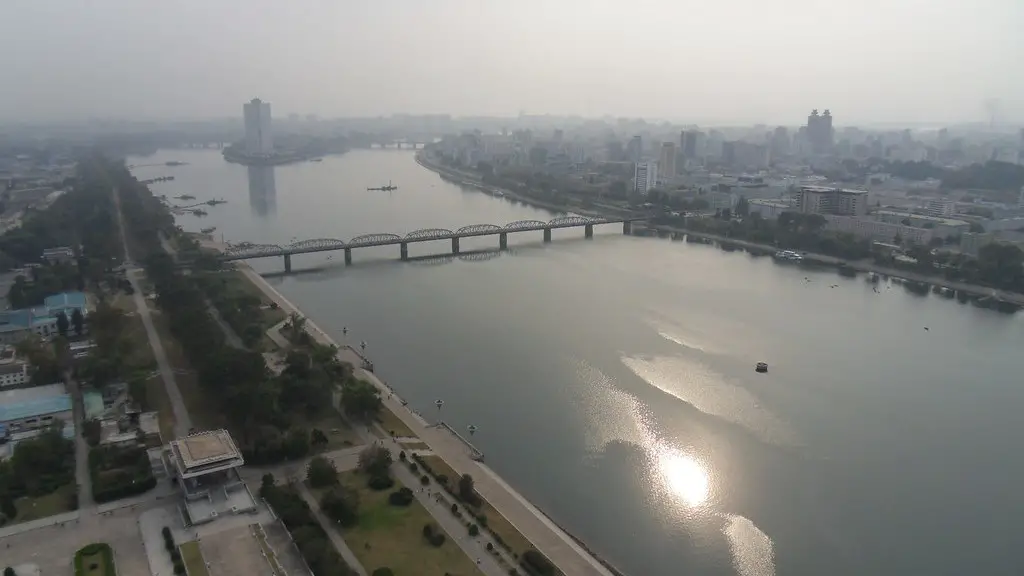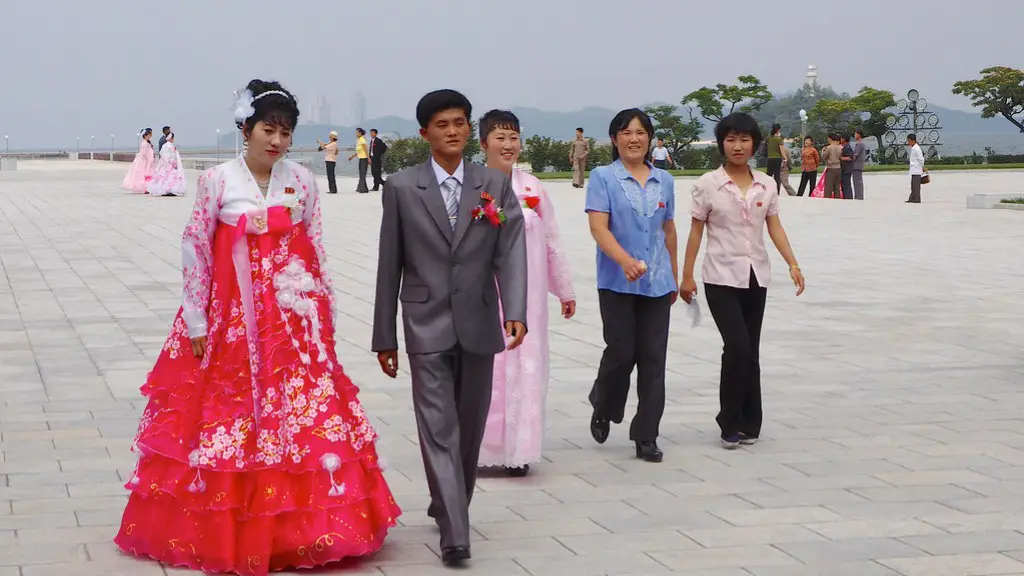North Korea, officially the Democratic People’s Republic of Korea (DPRK), has long been a controversial subject on the international stage. With nuclear and ballistic missile testing, famine, and oppressive government rule, North Korea is isolated in the global economic and political community. This isolation comes in the form of economic sanctions imposed by several countries, including the United States, the United Nations, and the European Union, targeting a wide range of North Korean exports, imports, and financial transactions.
The goal of these sanctions is to bring about an end to the North Korean government’s nuclear and ballistic missile testing and to its human rights violations. The Unites States has argued that the sanctions are intended not just to punish North Korea, but to make the country realize the benefits of rejoining the global community and avoiding behaviors that jeopardize international peace and security.
According to experts, North Korea’s actions in recent years have been in breach of international law, and even if sanctions have not achieved the desired result of de-escalating tensions, they have helped in bringing attention to the region’s escalating issues. This is especially true with regards to the international community’s response to North Korea’s nuclear missiles program since 2012, which has seen the UN publicly condemn the country’s actions and ratchet up the economic sanctions.
In addition to economic sanctions, the United States has also imposed a number of travel and visa bans on North Korea. This includes not allowing citizens of the US, their dependents, and their adopted children from visiting North Korea. This move is intended to prevent the North Korean government from channeling funds to their leaders and military projects, through tourism generated by US citizens. The State Department website also warns travelers against “any activity that may contribute to the North Korean government’s nuclear or ballistic missile programs or that otherwise support activities that are contrary to the national security or foreign policy of the United States.”
Sanctions and visa bans from world powers have proven effective in deterring North Korea from engaging in further activities against international norms, but the advantages and impacts on any positive change are debatable. The immediate effects of the sanctions on the North Korean economy have been severe, upsetting the balance between the government’s authoritarian control and its ability to provide economic stability to the citizens. While the effects of the sanctions have done little to improve human rights and bring about disarmament, they have put additional pressure on the government and demonstrated the international community’s firm opposition to nuclear proliferation.
At the same time, there are some who believe that the sanctions have caused more harm than good. They argue that the poor economic conditions created by the sanctions have the potential to destabilize the region and spark mass displacement. They also note that North Korea has used the imposition of the international sanctions as an excuse for its own human rights abuses and for the lack of any meaningful reforms.
Amid the ongoing debates over the effectiveness of sanctions and visa bans on North Korea, there is also criticism of their potential to lead to further isolation and draconian control. The United Nations has urged the international community to consider the effects of the sanctions on its citizens. For the international community to influence North Korea in a positive manner, there must be a clear strategy for engaging in constructive dialogue, sanctions, and diplomatic measures that are tailored to the country’s unique situation.
Effects Of Sanctions In North Korea’s Political Situation
The effects of the sanctions imposed on North Korea have been far-reaching, with the country’s political situation having been particularly affected. The sanctions have not only put the nation in a precarious economic position but have also caused a fracture between the country’s population and leadership. As economic isolation has become the norm, the government has increasingly resorted to heavy-handed tactics and sharp rhetoric to maintain its shaky grip on power.
Reports indicate that the North Korean government has used the sanctions as an excuse for its own oppressive policies, including the tightening of its authoritarian control over citizens. This has included increased ideological policing, attempts to further limit freedom of speech and assembly, and the arbitrary detention of dissidents. International monitors have further cited a deterioration in the human rights situation in North Korea, with restrictions on access to the outside world, the banning of unsanctioned foreign media, and harsh punishments for perceived enemies.
At the same time, the sanctions have created a wedge between the country’s citizens and leadership, with reports of growing anti-regime unrest and dissatisfaction with the government’s outlook. The sanctions have further limited the ability of the North Korean people to access food and medicine. This has further eroded the prevailing public sentiment towards the government.
Counter-Measures To Sanctions
The North Korean government has sought to counter the sanctions imposed by the international community. Although the measures taken have mostly been in the form of domestic policies, such as increasing production and food rationing, the government has also attempted to strengthen its external relations. This has included a number of diplomatic trips, including the historic visit to South Korea by the nation’s leader Kim Jong Un in 2018, as well as efforts to establish new economic and military ties.
At the same time, the North Korean government has sought to use its existing economic ties with other countries to its advantage, seeking to increase its access to foreign weapons and raw materials. Such measures have included increased imports of fuel and other luxury items, as well as attempts to circumvent sanctions by using diplomatic immunity and false documentation. The government has also sought to bolster its ability to conduct international monetary transactions through the establishment of dedicated banking networks.
The North Korean government has further sought to curry favor with the international community by engaging in a number of goodwill gestures. This has included publicly expressing a willingness to de-escalate the current situation on the Korean peninsula, as well as attempts to demonstrate good faith through a cap on nuclear activities and ballistic missile testing.
Other Countries Involvement With Sanctions
The United States is not the only nation involved in the enforcement of North Korea sanctions, although it has largely been the lead player in this effort. Many other countries have contributed to the imposition of sanctions, both through direct action and through the United Nations Security Council.
One notable example is the European Union, which imposed a series of sanctions in 2020 in response to North Korea’s proliferation of weapons of mass destruction. These sanctions make it illegal for any EU entity to do business with North Korean entities or individuals. Additionally, the EU has restricted the financial activities of North Korean entities, imposed a travel ban, and tightened its customs controls.
China and Russia have also played a role in the enforcement of sanctions against North Korea. Both countries have a vested interest in limiting North Korea’s access to financing and foreign markets, as well as in deterring its proliferation of weapons of mass destruction. Nonetheless, the two countries have at times sought to create loopholes in the sanctions regimen, seeking to weaken the overall effectiveness of the international community’s response.
Current Status Of Sanctions
Despite the continued imposition of sanctions, the North Korean government shows no signs of relenting, and many experts believe that the current pressure is having little effect. It is in this context that a number of countries have either expressed their support for an easing of sanctions or are actively pursuing such a policy.
The United States and the United Kingdom have expressed a willingness to engage in talks with North Korea, with the US even offering to ease sanctions in return for meaningful progress on denuclearization. These talks have gone nowhere, however, and the United States has since maintained its hard line on the sanctions regime.
China, on the other hand, has sought to soften its stance on the matter, arguing in favour of a “freeze-for-freeze” policy, whereby North Korea’s nuclear activities would be frozen in exchange for the international community’s cessation of sanctions. The Chinese proposal, however, has been met with resistance from the United States, which views the proposal as a way for North Korea to continue its nuclear activities without consequence.
Impact On North Korea Humanitarian Situation
The humanitarian situation in North Korea has been heavily impacted by the sanctions imposed on the country. The sanctions have made it significantly more difficult to provide food, medical goods, and other essential items to the country’s citizens, with the government’s failing agricultural policies making the situation worse.
Reports indicate that the situation has deteriorated significantly in recent years, with increasing malnutrition, starvation, and poor healthcare services. The sanctions have further limited the access of international aid groups to the country, making it even more difficult to provide vital humanitarian aid.
At the same time, the sanctions have had an unintended consequence, as the government has increasingly used its failing economic situation as an excuse to ramp up its oppressive measures. This has included further restrictions on citizens’ political rights, with human rights activists and dissidents increasingly being targeted by the government.
The international community has expressed concern over the impact of the sanctions on the country’s humanitarian situation, and a number of countries have sought to provide humanitarian aid. This has included South Korea, who, in 2018, launched a humanitarian aid program aimed at providing food and medical supplies to the country. A number of international aid groups have also been active in providing aid, although the impact of their efforts is limited due to the government’s severe restrictions on foreign aid.





